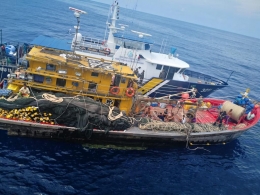The various effects of illegal fishing theft are what really worries the world, so this has become a common enemy that needs joint handling not only to focus on legal action but also prevention and efforts to repair damage to illegal fishing theft.
Eradication of "Illegal Fishing" Must Be Continued
Seeing the complexity of the problems related to illegal fish theft crimes has become a necessity for the world, especially Indonesia, so that efforts to eradicate illegal fish theft continue to be carried out besides prevention efforts must also be encouraged.
For Indonesia, efforts to eradicate IUU Fishing can improve the competitiveness of Indonesian fishery products in the international fish trade arena. The people of developed countries already have high awareness and reject fishery products obtained from IUU Fishing activities. Developed countries importing global fishery products have also implemented policies to eradicate IUU Fishing through international trade instruments (trade measure), as practiced by the European Union (EU) and the United States (US) as the two major global fish importers.
We take the historical example of the implementation of a trade measure, which is an embargo made by the USA government on shrimp products originating from exporting countries that do not apply the policy of installing Turtle Excluder Devices in trawl nets starting in 1996. The basis of the policy is Article XX letter g The 1994 General Agreement on Tariffs and Trade (GATT) which excludes free trade with the aim of protecting depleted natural resources, in this case the US policy is aimed at protecting the turtle population.
This jurisprudence is then used as a reference for developed countries to require traceability of fishery products through catch certificates to export countries which state that fishery products that are exported are free or not from IUU Fishing.
Fisheries sector oversight
Oversight of marine and fisheries resources plays a strategic role in the implementation of fisheries policies through the operational system of Monitoring, Control, and Surveillance (MCS). Monitoring or continuous data collection has been carried out properly through the application of e-logbooks, placement of observers on fishing vessels and recording of fish landings at ports.
Data obtained from the monitoring process then becomes a consideration for implementing control. Control is carried out through the permit system, the regulation of fishing gear, fishing areas, types of fish that are prohibited from being caught or protected and other technical regulations.
Oversight of marine and fisheries resources serves to oversee compliance of fisheries businesses with the regulations that have been determined. If fisheries supervision is weak, then the technical regulations that have been determined are not implemented properly and can further thwart the achievement of the fisheries policies that have been set.
Fisheries supervision has been carried out properly through the use of fishing vessel monitoring technology (VMS) and satellite imagery to monitor fishing vessels, coordinated implementation of sea and air patrols and supervision of all stages of fishery activities by fisheries supervisors.







